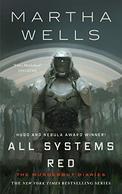
| Series: | Murderbot Diaries #1 |
| Publisher: | Tor.com |
| Copyright: | May 2017 |
| ISBN: | 0-7653-9752-8 |
| Format: | Kindle |
| Pages: | 150 |
This is an ebook, so metadata may be inaccurate or missing. See notes on ebooks for more information.
I could have become a mass murderer after I hacked my governor module, but then I realized I could access the combined feed of entertainment channels carried on the company satellites. It had been well over 35,000 hours or so since then, with still not much murdering, but probably, I don't know, a little under 35,000 hours of movies, serials, books, plays, and music consumed. As a heartless killing machine, I was a terrible failure.
So begins the first of a series of novellas by Martha Wells (four to date) called The Murderbot Diaries. It's told in the first person by a murderbot (the name it gave itself; the officially bland and non-threateningly corporate term is SecUnit) with a defective governor module who is therefore not enslaved to the commands of the humans around it. The story opens with Murderbot half-heartedly doing its job of protecting a human exploration team while pretending to be just like any other SecUnit, deftly covering up the deficiencies in its governor module. Unfortunately for the humans it's guarding, the planet is rather more dangerous than they had expected, and not only due to local conditions. Thankfully for the humans, Murderbot is rather better at protecting people than it likes to claim.
I'm going to say the same thing that everyone else who reviewed this multiple-award-winning novella said: the first-person narrative voice is what makes this story. The plot is corporate interstellar skulduggery following mostly predictable lines, and by itself wouldn't be anything special. But Murderbot tells that story with a brilliant mix of cynicism, dark humor, clipped precision, and violent competence, overlaid on a slightly flat tone that reminded me of computerized record-keeping and automated analysis. It's wonderfully evocative. It also does serious character work in a short 150 pages, particularly once Murderbot starts interacting with the well-meaning, open-minded, and rather naive humans that it's trying to protect.
That leads into the second remarkable thing about this story, which is the quietly nuanced and fascinating way that it talks about oppression, justice, and well-meaning people who want to help.
This is, obviously, a story about a member of a sentient slave race. Murderbot is made of augmented biological components, including a rather human brain, and is clearly as capable of independent thoughts and desires as anyone else in this story. This is an old and well-worn setup with obvious resonance with the slave trade and a habit of turning into soaring, passionate fights for freedom.
Murderbot cares very deeply about no one discovering its defective governor module, but is not interested in the soaring and passionate fight for freedom. Murderbot wants everyone else to fuck off and leave it alone so that it can watch serial dramas. It is particularly horrified at the idea of being stared at by a bunch of humans, or having emotionally searching conversations about its free will and how it feels about slavery.
There's certainly nothing inherently wrong with courageous and moving fights for freedom, but I think Wells is doing something very interesting here instead. The humans are all well-meaning folks who (in various ways) are horrified at the concept of SecUnits and how they're treated, and also have a noticeable tendency to treat Murderbot like a child. One starts cringing a bit at the earnest gentleness with which they approach it, particularly with the running hints from Murderbot's acerbic commentary that they're missing the point entirely. Wells packs a rather deep idea into a short space: freedom isn't about being an amazing role model or following some expected, scripted path. It's about having the space to live your own life and do what you want, whether or not that fits anyone else's preconceptions. Someone in Murderbot's situation may be quite matter-of-fact and tactical about their own circumstances, which can include not wanting even the best of people to take over their decisions. And can include a very complicated reaction to sympathy.
I liked all of the people in this story (well, except for the villains, but they're mostly there to be villains and are barely sketched in). But Murderbot itself steals the show, and the ending was perfect. And a great setup for the sequels.
I've been meaning to read something by Martha Wells for years and kept not getting around to it. I'm glad I finally fixed that, and will definitely be reading the rest of this series. Recommended.
Followed by Artificial Condition.
Reviewed: 2018-12-30